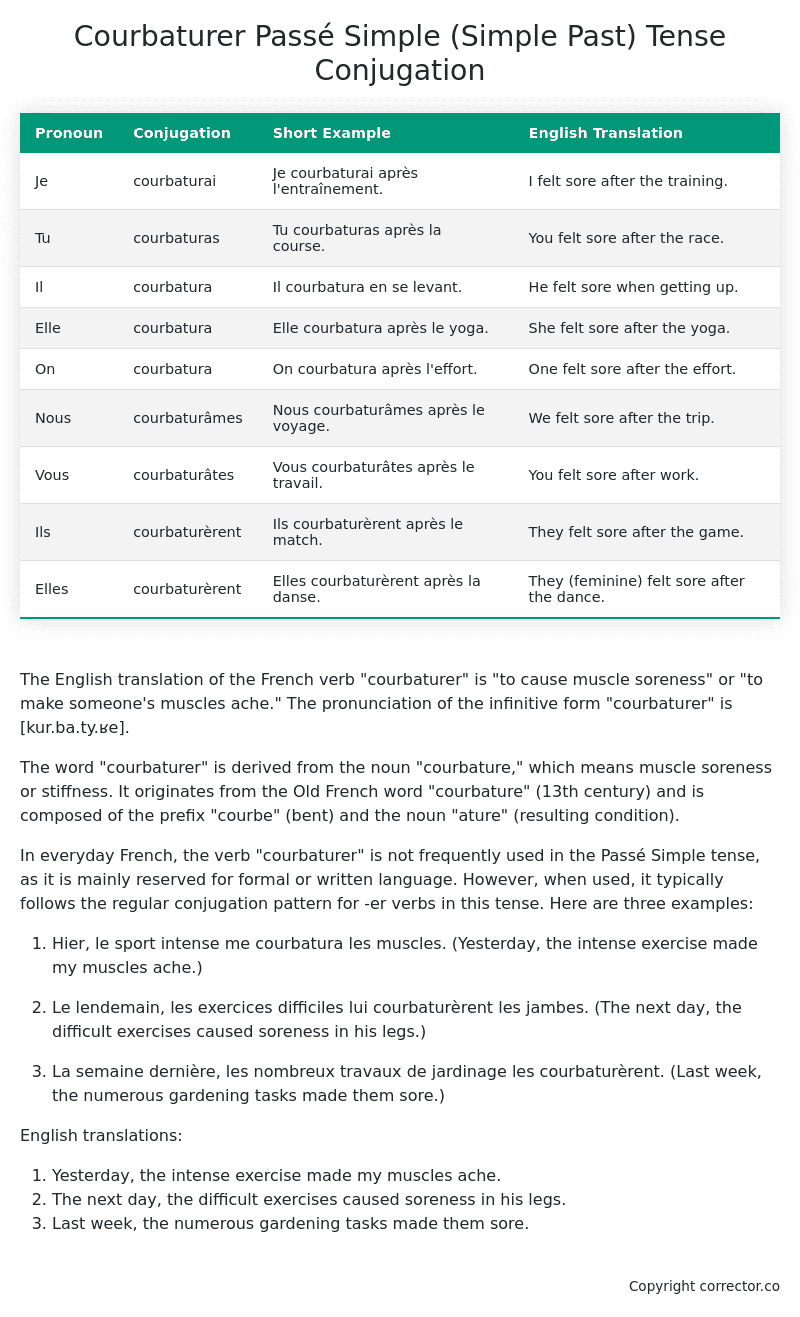Passé Simple (Simple Past) Tense Conjugation of the French Verb courbaturer
Introduction to the verb courbaturer
The English translation of the French verb “courbaturer” is “to cause muscle soreness” or “to make someone’s muscles ache.” The pronunciation of the infinitive form “courbaturer” is [kur.ba.ty.ʁe].
The word “courbaturer” is derived from the noun “courbature,” which means muscle soreness or stiffness. It originates from the Old French word “courbature” (13th century) and is composed of the prefix “courbe” (bent) and the noun “ature” (resulting condition).
In everyday French, the verb “courbaturer” is not frequently used in the Passé Simple tense, as it is mainly reserved for formal or written language. However, when used, it typically follows the regular conjugation pattern for -er verbs in this tense. Here are three examples:
-
Hier, le sport intense me courbatura les muscles.
(Yesterday, the intense exercise made my muscles ache.) -
Le lendemain, les exercices difficiles lui courbaturèrent les jambes.
(The next day, the difficult exercises caused soreness in his legs.) -
La semaine dernière, les nombreux travaux de jardinage les courbaturèrent.
(Last week, the numerous gardening tasks made them sore.)
English translations:
- Yesterday, the intense exercise made my muscles ache.
- The next day, the difficult exercises caused soreness in his legs.
- Last week, the numerous gardening tasks made them sore.
Table of the Passé Simple (Simple Past) Tense Conjugation of courbaturer
| Pronoun | Conjugation | Short Example | English Translation |
|---|---|---|---|
| Je | courbaturai | Je courbaturai après l’entraînement. | I felt sore after the training. |
| Tu | courbaturas | Tu courbaturas après la course. | You felt sore after the race. |
| Il | courbatura | Il courbatura en se levant. | He felt sore when getting up. |
| Elle | courbatura | Elle courbatura après le yoga. | She felt sore after the yoga. |
| On | courbatura | On courbatura après l’effort. | One felt sore after the effort. |
| Nous | courbaturâmes | Nous courbaturâmes après le voyage. | We felt sore after the trip. |
| Vous | courbaturâtes | Vous courbaturâtes après le travail. | You felt sore after work. |
| Ils | courbaturèrent | Ils courbaturèrent après le match. | They felt sore after the game. |
| Elles | courbaturèrent | Elles courbaturèrent après la danse. | They (feminine) felt sore after the dance. |
Other Conjugations for Courbaturer.
Le Present (Present Tense) Conjugation of the French Verb courbaturer
Imparfait (Imperfect) Tense Conjugation of the French Verb courbaturer
Passé Simple (Simple Past) Tense Conjugation of the French Verb courbaturer (You’re reading it right now!)
Passé Composé (Present Perfect) Tense Conjugation of the French Verb courbaturer
Futur Simple (Simple Future) Tense Conjugation of the French Verb courbaturer
Futur Proche (Near Future) Tense Conjugation of the French Verb courbaturer
Plus-que-parfait (Pluperfect) Tense Conjugation of the French Verb courbaturer
Passé Antérieur (Past Anterior) Tense Conjugation of the French Verb courbaturer
Futur Antérieur (Future Anterior) Tense Conjugation of the French Verb courbaturer
Subjonctif Présent (Subjunctive Present) Tense Conjugation of the French Verb courbaturer
Subjonctif Passé (Subjunctive Past) Tense Conjugation of the French Verb courbaturer
Subjonctif Imparfait (Subjunctive Imperfect) Tense Conjugation of the French Verb courbaturer
Conditionnel Présent (Conditional Present) Tense Conjugation of the French Verb courbaturer
Conditionnel Passé (Conditional Past) Tense Conjugation of the French Verb courbaturer
Conditionnel Passé II (Conditional Past II) Tense Conjugation of the French Verb courbaturer
L’impératif Présent (Imperative Present) Tense Conjugation of the French Verb courbaturer
L’impératif Passé (Imperative Past) Tense Conjugation of the French Verb courbaturer
L’infinitif Présent (Infinitive Present) Tense Conjugation of the French Verb courbaturer
L’infinitif Passé (Infinitive Past) Tense Conjugation of the French Verb courbaturer
Le Participe Présent (Present Participle) Tense Conjugation of the French Verb courbaturer
Le Participe Passé (Past Participle) Tense Conjugation of the French Verb courbaturer
Struggling with French verbs or the language in general? Why not use our free French Grammar Checker – no registration required!
Get a FREE Download Study Sheet of this Conjugation 🔥
Simply right click the image below, click “save image” and get your free reference for the courbaturer Passé Simple tense conjugation!

Courbaturer – About the French Passé Simple (Simple Past) Tense
Formation
Usage
Narration
Historical Context
Interactions with other tenses
Passé Composé
Imparfait
Conditional and Subjunctive
Summary
I hope you enjoyed this article on the verb courbaturer. Still in a learning mood? Check out another TOTALLY random French verb conjugation!


